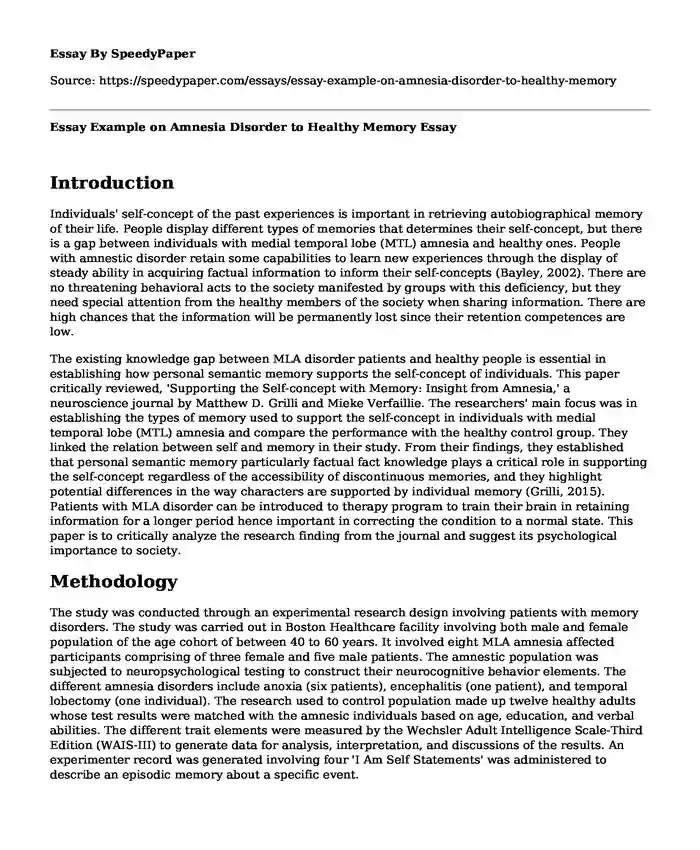Introduction
Individuals' self-concept of the past experiences is important in retrieving autobiographical memory of their life. People display different types of memories that determines their self-concept, but there is a gap between individuals with medial temporal lobe (MTL) amnesia and healthy ones. People with amnestic disorder retain some capabilities to learn new experiences through the display of steady ability in acquiring factual information to inform their self-concepts (Bayley, 2002). There are no threatening behavioral acts to the society manifested by groups with this deficiency, but they need special attention from the healthy members of the society when sharing information. There are high chances that the information will be permanently lost since their retention competences are low.
The existing knowledge gap between MLA disorder patients and healthy people is essential in establishing how personal semantic memory supports the self-concept of individuals. This paper critically reviewed, 'Supporting the Self-concept with Memory: Insight from Amnesia,' a neuroscience journal by Matthew D. Grilli and Mieke Verfaillie. The researchers' main focus was in establishing the types of memory used to support the self-concept in individuals with medial temporal lobe (MTL) amnesia and compare the performance with the healthy control group. They linked the relation between self and memory in their study. From their findings, they established that personal semantic memory particularly factual fact knowledge plays a critical role in supporting the self-concept regardless of the accessibility of discontinuous memories, and they highlight potential differences in the way characters are supported by individual memory (Grilli, 2015). Patients with MLA disorder can be introduced to therapy program to train their brain in retaining information for a longer period hence important in correcting the condition to a normal state. This paper is to critically analyze the research finding from the journal and suggest its psychological importance to society.
Methodology
The study was conducted through an experimental research design involving patients with memory disorders. The study was carried out in Boston Healthcare facility involving both male and female population of the age cohort of between 40 to 60 years. It involved eight MLA amnesia affected participants comprising of three female and five male patients. The amnestic population was subjected to neuropsychological testing to construct their neurocognitive behavior elements. The different amnesia disorders include anoxia (six patients), encephalitis (one patient), and temporal lobectomy (one individual). The research used to control population made up twelve healthy adults whose test results were matched with the amnesic individuals based on age, education, and verbal abilities. The different trait elements were measured by the Wechsler Adult Intelligence Scale-Third Edition (WAIS-III) to generate data for analysis, interpretation, and discussions of the results. An experimenter record was generated involving four 'I Am Self Statements' was administered to describe an episodic memory about a specific event.
Discussions
From the study, the researchers found out that amnestic participants and the control group relied on the retrieval of individual semantic memories, particularly personal traits and experiences to support their self-statements in recitation assignment. The mind disorder participants exhibited fewer personal semantic memories as compared to the healthy lot. This proves that brain damage leads to memory loss, which can either be temporal or permanent depending on the magnitude of the inflicted condition. For the episodic memories, the control subject accessed their unique experienced occasions to explain their self-statements while the test participants were not able to retrieve them.
The study encountered a limitation where the researchers did not gather and provide information about the time of which the individual traits and memories were developed. It could be useful in determining if length duration is a contributing factor to an individual's memory loss. Semantic memories should coincide with time when each character and knowledge was made.
The study is important to society because it educates them on how to converse with victims of brain damage suffering from memory loss. It trains people to exercise patience to try and fix the amnestic people. The knowledge from the research is useful to psychologists during their therapy sessions of correcting the brain impairment suffered by patients. From my person personal experience, I agree with the findings MLA amnesia causes remembrance disruption of a person. Therefore I concur with the outcome results of the study and the need for scholars to find psychological science treatment for the brain defect.
Conclusion
In conclusion, I never knew that brain destruction from physical injury to the head of an individual can lead to memory loss of their characters and roles; therefore there is a need for medical and psychosomatic treatment to patients with brain damages. Patients with MLA amnesia struggle to get access to their memories; they should be subjected to visual and verbal therapies to help them remember the loss.
References
Grilli M. D, M. V. (2015). Supporting the Self-Concept with memory: Insight from Amnesia. Social Cognitive and Affective Neuroscience, 1684-1692.
Bayley P. J, L. R. (2002). Medical Temporal Lobe Amnesia: Acquisition of Factual Information by Non-declarative Memory. The Journal of Neuroscience, 5741-5748.
Cite this page
Essay Example on Amnesia Disorder to Healthy Memory. (2023, Jan 13). Retrieved from https://speedypaper.net/essays/essay-example-on-amnesia-disorder-to-healthy-memory
Request Removal
If you are the original author of this essay and no longer wish to have it published on the SpeedyPaper website, please click below to request its removal:
- Educational Study Methods, Free Essay Example
- Essay Example about Healthcare in the United States
- When Did the US Enter WW2 - Free Essay in History
- Literary Essay Sample on The Epic of Gilgamesh and Tyranny and Democracy
- Free Paper: Aligning the Enrolment of Students with Placement Opportunities by Universities in Rural Pennsylvania
- Free Essay Example on Conflict Resolution
- Free Essay Sample - Business Organization Culture
Popular categories





